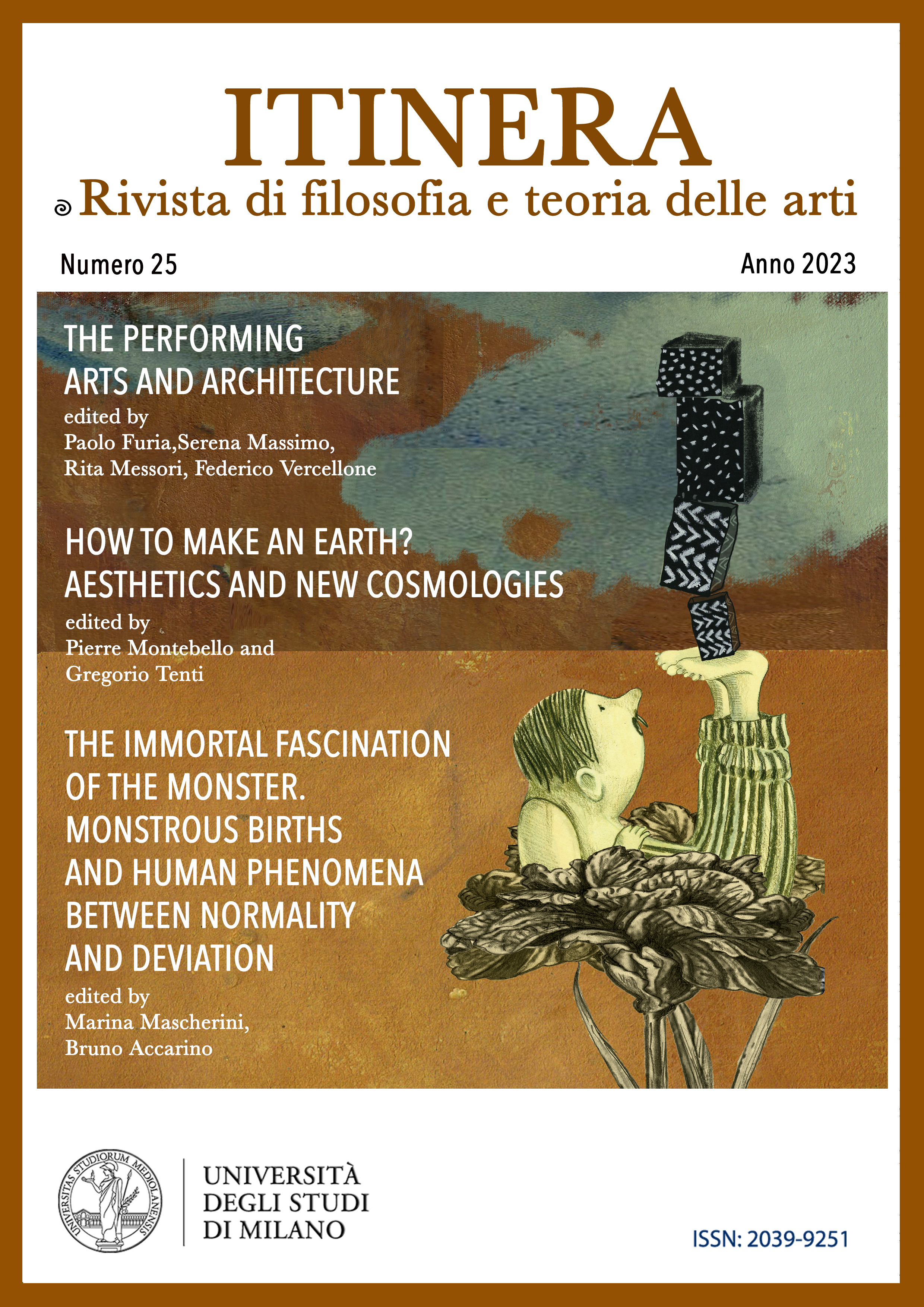De la chose sensible à la chose esthétique. Le passage de l’instrumentalisation à la configuration du monde
DOI:
https://doi.org/10.54103/2039-9251/20824Abstract
Through Heidegger’s re-reading of Descartes, this article explores a fundamental issue in the contemporary conception of worldliness. In a restricted sense, the human being is the maker of the world in that he appropriates what composes it, i.e., the worldly beings or things. Greatly influenced by the Cartesian notion of extensio, this tendency no longer entails the world as a thing in itself, but as a set of measurable things, thus available and open to activity.
This article articulates the threat relative to the idea of the forming, by the human being, of the essence of the world. Every being, be it an object, an animal or even a human being, seems to be considered as a producer of energy and a structure that could be possessed. For example, such natural space is not campaign or land, but automatically field, that is to say, an agricultural deposit that is symbolically exploited and empirically exploitable. This ontological device prevents us from grasping the world in any other way than in terms of use and productivity.
As a result, the ontology of the thing becomes an aesthetic issue in its own right. This issue does not involve here the capture of the object as a bearer of Beauty, but an aesthetic relation in the fundamentally etymological sense (αἰσθητικός) of what is felt, of what is sensible and perceptible. The need for an aesthetic rereading of the world and the things that stand in it presupposes, therefore, the evolution of the human gaze and a metaphysical approach to worldliness, detached from the instrumentalization of the beings and focused on their presence or their proximity. This article aims at demonstrating the necessity of a real human aesthetic responsibility, which can be concretized in the metaphysical thought of the thing that the human being unfolds, by considering it as the persistence in the world of an object whose ontological disposition could never be neutral.
Downloads
Riferimenti bibliografici
Arjakovsky, P., Fédier, F., et France-Lanord, H., Le Dictionnaire Martin Heidegger - Vocabulaire Polyphonique de Sa Pensée, Dictionnaires, Cerf, Paris 2013.
Beaufret, J., Dialogue avec Heidegger, Arguments, Editions de Minuit, Paris 1978.
Brague, R., cité par P. Destrée, Une mise à l’épreuve d’Aristote à partir de Heidegger, in “Revue Philosophique de Louvain”, Quatrième Série, 87, N°76, 1989, pp. 629-639.
Heidegger, M., Être et Temps, traduit par François Vézin, Gallimard, Paris 1986.
Heidegger, M., Être et Temps, éd. par J. Lechaux et E. Ledru, traduit par E. Martineau, Authentica Alençon 1985.
Heidegger, M., La question de la technique, in “Essais et Conférences”, traduit par A. Préau, Tel, Gallimard, Paris 1958.
Heidegger, M., Science et Méditation, in “Essais et Conférences”, traduit par A. Préau, Tel, Gallimard, Paris 1958.
Heidegger, M., Les Concepts fondamentaux de la métaphysique : Monde-Finitude-Solitude, traduit par Daniel Panis, NRF, Gallimard, Paris 1992.
Heidegger, M., Chemins qui ne mènent nulle part, traduit par W. Brokmeier, Tel, Gallimard, Paris 1986.
Heidegger, M., La chose, in “Essais et Conférences”, traduit par A. Préau, Tel, Gallimard, Paris 1958.
Heidegger, M., Bâtir Habiter Penser, in “Essais et Conférences”, traduit par André Préau, Tel, Gallimard, Paris 1958.
Heidegger, M., L’Origine de l’œuvre d’art, dans “Chemins Qui Ne Mènent Nulle Part”, traduit par Wolfgang Brokmeier, Tel, Gallimard, Paris 1962.
Heidegger, M., Gesamtausgabe, traduit par V. Klostermann, Francfort-sur-le-Main 1975.
Husserl, E., Recherches logiques, traduit par H. Elie, A. L. Kelkel, et R. Scherer, Epiméthée, Presses Universitaires de France, 3 vols, Paris 1962.
Sloterdijk, P., Règles pour le parc humain. Une lettre en réponse à la lettre sur l’humanisme de Heidegger ; Suivi de La domestication de l’Être. Pour un éclaircissement de la clairière, traduit par Olivier Mannoni, Mille et une nuits, Paris 1999.
Volpi, F., Heidegger e Aristotele, Daphne, Padova 1984.
Dowloads
Pubblicato
Versioni
- 2023-08-17 (2)
- 2023-08-08 (1)
Come citare
Fascicolo
Sezione
Licenza
Copyright (c) 2023 Jessica Lombard

Questo lavoro è fornito con la licenza Creative Commons Attribuzione - Condividi allo stesso modo 4.0.
Gli autori che pubblicano su questa rivista accettano le seguenti condizioni:
1. Gli autori mantengono i diritti sulla loro opera e cedono alla rivista il diritto di prima pubblicazione dell'opera, contemporaneamente licenziata sotto una Licenza Creative Commons - Attribuzione - Condividi allo stesso modo 4.0 internazionale che permette ad altri di condividere l'opera indicando la paternità intellettuale e la prima pubblicazione su questa rivista.
2. Gli autori possono aderire ad altri accordi di licenza non esclusiva per la distribuzione della versione dell'opera pubblicata (es. depositarla in un archivio istituzionale o pubblicarla in una monografia), a patto di indicare che la prima pubblicazione è avvenuta su questa rivista.
3. Gli autori possono diffondere la loro opera online (es. in repository istituzionali o nel loro sito web) prima e durante il processo di submission, poiché può portare a scambi produttivi e aumentare le citazioni dell'opera pubblicata (Vedi The Effect of Open Access).





